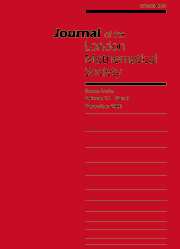Article contents
SET THEORY IS INTERPRETABLE IN THE AUTOMORPHISM GROUP OF AN INFINITELY GENERATED FREE GROUP
Published online by Cambridge University Press: 30 October 2000
Abstract
In [6] S. Shelah showed that in the endomorphism semi-group of an infinitely generated algebra which is free in a variety one can interpret some set theory. It follows from his results that, for an algebra Fℵ which is free of infinite rank ℵ in a variety of algebras in a language L, if ℵ > |L|, then the first-order theory of the endomorphism semi-group of Fℵ, Th(End(Fℵ)), syntactically interprets Th(ℵ,L2), the second-order theory of the cardinal ℵ. This means that for any second-order sentence χ of empty language there exists χ*, a first-order sentence of semi-group language, such that for any infinite cardinal ℵ > |L|,
formula here
In his paper Shelah notes that it is natural to study a similar problem for automorphism groups instead of endomorphism semi-groups; a priori the expressive power of the first-order logic for automorphism groups is less than the one for endomorphism semi-groups. For instance, according to Shelah's results on permutation groups [4, 5], one cannot interpret set theory by means of first-order logic in the permutation group of an infinite set, the automorphism group of an algebra in empty language. On the other hand, one can do this in the endomorphism semi-group of such an algebra.
In [7, 8] the author found a solution for the case of the variety of vector spaces over a fixed field. If V is a vector space of an infinite dimension ℵ over a division ring D, then the theory Th(ℵ, L2) is interpretable in the first-order theory of GL(V), the automorphism group of V. When a field D is countable and definable up to isomorphism by a second-order sentence, then the theories Th(GL(V)) and Th(ℵ, L2) are mutually syntactically interpretable. In the general case, the formulation is a bit more complicated.
The main result of this paper states that a similar result holds for the variety of all groups.
- Type
- Research Article
- Information
- Copyright
- The London Mathematical Society 2000
- 1
- Cited by




